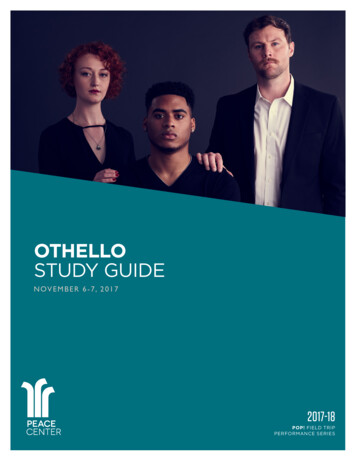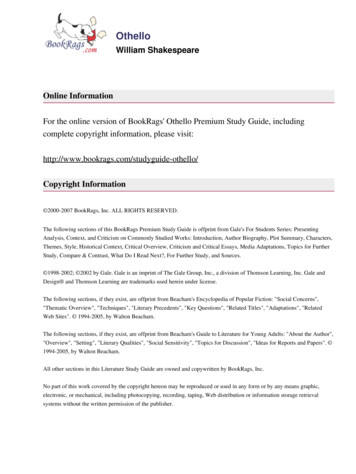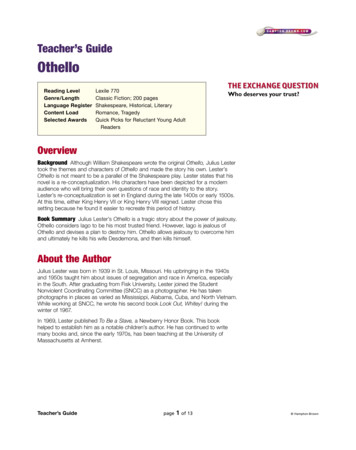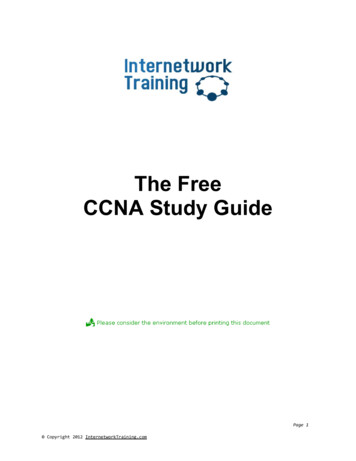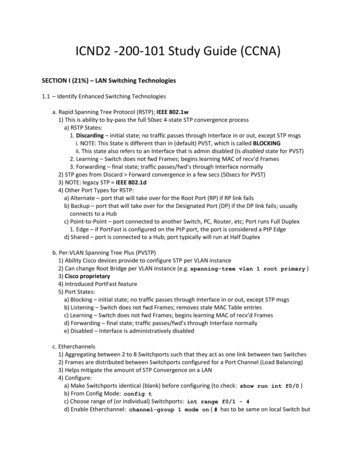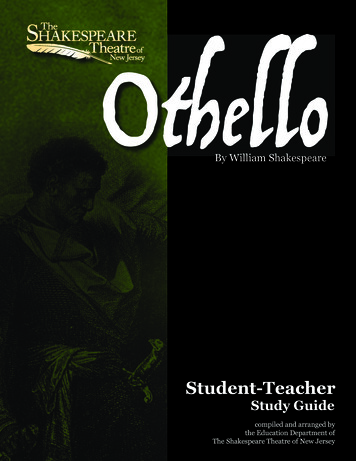
Transcription
OthelloBy William ShakespeareStudent-TeacherStudy Guidecompiled and arranged bythe Education Department ofThe Shakespeare Theatre of New Jersey
The Shakespeare Theatre of New JerseyTIMON OF ATHENS: Know-the-Show GuideIn This Guide:Classroom Activities for Teachers and Students.p2Shakespeare: Helpful Tips For Exploring & Seeing His Works .p3Othello: A Short Synopsis .p4Who’s Who in Othello.p5About the Playwright.p6Shakespeare’s London .p7Sources and History of Othello .p8Director’s Thoughts on Othello .p9The Jealous Outsider(s) .p11Commentary and Criticism.p12Selections from Gli Hecatommithi.p13Further Reading.p16Are You SURE This is English? .p17Shakespeare’s Common Tongue.p18Terms and Phrases Found in Othello .p18What Did He Say/Who Said That - Quizzes.p20Topics for Discussion .p21Test Your Understanding Quiz .p22Follow-Up Activities.p23Answers to Quizzes.p24Meeting the NJ Core Curriculum Content Standards .p25About The Shakespeare Theatre of New Jersey .back cover-1-
The Shakespeare Theatre of New JerseyOTHELLO: Student/Teacher Study GuideC L A S S R O O M TSACTIVITIESFOREACHERS ANDTUDENTSWhat we hear most from educators is that there is a great deal of anxiety when it comes to Shakespeare; seeing it,reading it and especially teaching it. One of the principal goals of The Shakespeare Theatre of New Jersey’s educationprograms is to demystify Shakespeare, take him “off the shelf” and re-energize his work for students and teachers alike.Toward these goals, this Study Guide provides educators with tools to both allay their own concerns and to expand thetheatre-going experience for their students beyond the field trip to The Shakespeare Theatre.The information included in this guide will help you expand your students’ understanding of Shakespeare in performance,as well as help you meet many of the New Jersey Core Curriculum Content Standards. We encourage you to impart asmuch of the information included in this Study Guide to your students as is possible. The following are some suggestionsfrom teachers on how you can utilize elements of the guide given limited classroom time. Many teachers have found that distributing or reading the Short Synopsis and Who‘s Who pages has greatlyincreased students’ understanding and enjoyment of the production. It provides the students with a generalunderstanding of what they will be seeing and what they can expect. Some teachers have simply taken the lastfive minutes of a class period to do this with very positive results. When more class time is available prior to your visit, we recommend incorporating the background informationon William Shakespeare and the play itself. One teacher divided her class into groups and assigned each groupresearch topics based on the divisions found in the study guide. Using a copy of the corresponding studyguide page as a launch pad, the students had one week to research the topics. The students then presentedtheir information to the class in three- to five-minute oral reports. Including the questions that evolved fromthe presentations, the entire project took only one class period. I am told that the reading of Old English andMiddle English texts was “quite entertaining and very informative.” Using the questions found in the “TOPICS FOR DISCUSSION,” many teachers will opt to take a class period afterthe trip to The Shakespeare Theatre of New Jersey to discuss the play with their students. The questions helpkeep the comments focused on the production, while incorporating various thematic and social issues that arefound in the play. One school spent two days working through performance-based activities (a few of which are suggested in the“FOLLOW-UP ACTIVITIES” section) with a particularly “difficult and rowdy” class. They were astounded withthe results. Their students took the opportunity to “ham it up,” and discovered a great joy and understandingfrom performing Shakespeare.“What’s My Line?”Promoting Active ListeningTeacher-tested, student-approved! Try thisexercise with your students:Before attending the production, give eachstudent one line from the play to listen for.Discuss the meaning of the line and encouragetheir input in deciphering what Shakespearemeant by the line. How would the studentperform the line? Why is the line important tothe play? Does it advance the plot, or give theaudience particular insight into a character orrelationship?Again, we hope you will incorporate as many portions of this studyguide as you are able into your classroom experience. If you haveany suggestions for activities or topics not already found in the StudyGuide, please contact our education department. We are alwaysinterested in hearing new ways to excite young people (and teachers)about Shakespeare and live theatre.Happy Teaching,Brian B. Crowe,Director of EducationFollowing the production, discuss the line again.Did the actor present the line in the way yourstudent expected? If not, how was it different?-2-The Shakespeare Theatre of New Jersey’sMain Stage
The Shakespeare Theatre of New JerseyOTHELLO: Student/Teacher Study GuideShakespeare: Helpful Tips For Exploring & Seeing His Works“Just plunge right in“My advice to anyone seeing Shakespeare:(to Shakespeare). See a play, read it aloud, rent a video, listento a tape. It’s up to you. When you look at Shakespeare closeup, he’s not as intimidating as when he’s seen from afar.”Norrie EpsteinThe Friendly ShakespeareTragedy can have humor, andgreat comedy always haselements of the tragic.Don’t worry somuch!Just make sure your ears are clean and youreyes are sharp. Listen and look and watch.Look at the distance people stand fromeach other; look at the relationships beingdeveloped.Stay with it.Don’t negate the move thatShakespeare will make toward your gut,toward your soul—because he will touch you there,if you allow yourself to be touched.”18th-century critics complained that Shakespeare’s tragedies weren’t consistentlyserious enough. According to the classic rules, tragedy should be uniformlysomber. Shakespeare’s use of humor in his tragedies prevents us from becomingwashed away in a dense fog of emotion. Rather, it forces us out of the “tragic”long enough to appreciate the level to which the play’s passions have taken us.“Some of the plays have taken on mythic proportions. By myths, I mean we grow upknowing certain things about [Shakespeare’s] characters but we don’t know how weknow them.There are lots ofSHAKESPEAREAN MICROCHIPSlodged in our brains.”Charles Marowitz, directorDon’t be afraid toLISTEN,WATCHAND REACT;“It was Olivier’s Henry Vthat made me realize thatShakespeare isabout real peopleand that his language wasn’t simplybeautiful poetry.”Robert Brustein, directorlaugh, cry, and be moved.Shakespeare wrote fora live and active audience.Both audience and actormust be involved to createa truly winning performance.-3--David Suchet, actor“There are someparts of the playsyou’ll never understand. But excuse me,I thought that’s whatgreat art was supposed to be about.DON’TFREAKOUTOVERIT!”Peter Sellars,Director
The Shakespeare Theatre of New JerseyOTHELLO: Student/Teacher Study GuideOthello: A Short SynopsisShakespeare’s great tragedy begins under the cover of nightin the city of Venice, a city-state famous for its military mightand as a center of trade. Roderigo, a gentleman who has triedto woo Desdemona, the lovely daughter of Senator Brabantio,has just learned that she has secretly married Othello, a heroicMoorish general in service to the Venetian state. Iago, Othello’sensign, speaks of his hatred for the Moor, and convincesRoderigo to wake Brabantio and inform him of the elopement.The enraged Brabantio sets out in search of his daughter andcalls for officers to arrest the Moor.with Othello to have him reinstated. Alone on stage, Iagooutlines his plan of action.In a private meeting arranged by Iago, Desdemona promisesCassio that she will intercede on his behalf with her husband.As Othello returns with Iago, Cassio quickly takes his leave. Iagocomments on Cassio’s abrupt departure, stating that Cassioseems to be attempting to avoid Othello. Desdemona pleadsenthusiastically for Cassio, and vows to never cease until herhusband pardons his friend. Othello is sympathetic to herpetition. As Desdemona and Emilia (Iago’s wife) depart, Iagoplants the seeds of doubt in Othello, insinuating that Cassio andDesdemona are having an affair right under Othello’s nose. AsDesdemona returns to call Othello in to dinner, Othello’s doubtsof her fidelity are already beginning to take hold. Seeing herhusband upset, but not knowing the cause, Desdemona offershim her handkerchief, her treasured first gift from the Moor. Ashe refuses it, it falls to the ground, and Emilia picks it up andgives it to Iago.Feigning friendship and concern, Iago warns Othello ofBrabantio’s reaction. Cassio, a lieutenant recently promotedby Othello to the position Iago had hoped for, arrives with anurgent message from the Duke: Othello’s assistance is neededto thwart a Turkish invasion of the Venetian-controlled isle ofCyprus. In the Senate chamber, Brabantio accuses Othello ofseducing his daughter with witchcraft. Othello, in his defense,explains that he won Desdemona’s heart by telling her storiesof his adventurous life. When Desdemona is summoned to theSenate chamber, she confirms her love for Othello and tells herfather that her allegiance is now to her husband.Beset by uncertainty and anxiety, Othello demands some proofthat Desdemona is unfaithful. Iago tells the Moor that he hasseen Cassio with Desdemona’s cherished handkerchief. Othelloasks Desdemona for the handkerchief, but not having it, shechanges the subject and again pleads for Othello to reconcilewith Cassio. Othello leaves in a rage, and Emilia suggests thatOthello may be jealous. Desdemona declares that he hasabsolutely no cause for jealousy. As the two women leave,Bianca, a courtesan in love with Cassio, enters searching for him.He gives her the handkerchief (which has been planted in hisroom by Iago), and asks Bianca to have its embroidery copied.Seeing no crime done, the Duke attempts to pacify Brabantio,and then turns his attention to the imminent Turkish threat andorders Othello to Cyprus. Othello welcomes the command, andDesdemona requests permission to go with her husband. It isarranged for her to travel with Iago the following day, as herhusband must depart immediately. Iago assures the gullibleRoderigo that Desdemona’s love for the Moor will soon wane,and convinces him to travel to Cyprus with the military fleet.Alone, Iago begins to lay plans to utilize Cassio as an instrumentto destroy Othello.Iago promises to provide Othello with additional proof of hiswife’s affair. As Othello conceals himself and listens, Iago andCassio talk about a woman. Cunningly, Iago talks to Cassioabout Bianca. Othello, however, assumes they are discussingDesdemona, and is now fully convinced of her guilt. He vowsto kill Desdemona and Iago vows to kill Cassio. Letters recallingOthello to Venice are brought by Lodovico. When Desdemonaspeaks to Lodovico about Cassio’s recent troubles, Othellobecomes furious, strikes his wife, and sends her away.In Cyprus, Othello’s arrival is anxiously awaited, followingreports of a violent storm at sea. When Othello’s ship docks, heinforms all that the Turkish fleet has been destroyed. In honorof his marriage and the defeat of the Turks, Othello allows timefor his troops to celebrate. During the festivities, Iago getsCassio drunk. Roderigo, under Iago’s direction, begins a quarrelwith the drunken lieutenant, which soon escalates into a brawlwhich culminates in Cassio stabbing Montano, an importantCypriot. Furious about the unrest that ensues, Othelloimmediately dismisses Cassio from his office as lieutenant.Cassio grieves over the loss of his position and his reputation,but Iago comforts him by suggesting that Desdemona will pleadMeanwhile, Iago convinces the gullible Roderigo that the onlyhope of gaining Desdemona’s love lies in killing Cassio. Late thatnight, they attack Cassio in the street. There is a quick skirmish,and both Roderigo and Cassio are wounded. The cries arouse-4-
The Shakespeare Theatre of New JerseyOTHELLO: Student/Teacher Study GuideWho’s Who in OthelloOthello, who assumes that Iago has murdered Cassio as he haspromised. Lodovico hastens to see what is the matter, and Iagoappears on the scene. Taking control of the situation, Iago killsRoderigo, and then feigns grief over his “friend’s” death.Othello—A Moorish general in service to Venice, wellpraised for his honesty, integrity and outstandingmilitary skills. He secretly weds the fair Desdemona.When his
Feigning friendship and concern, Iago warns Othello of Brabantio’s reaction. Cassio, a lieutenant recently promoted by Othello to the position Iago had hoped for, arrives with an urgent message from the Duke: Othello’s assistance is needed to thwart a Turkish invasion of the Venetian-controlled isle of Cyprus. In the Senate chamber, Brabantio accuses Othello of
